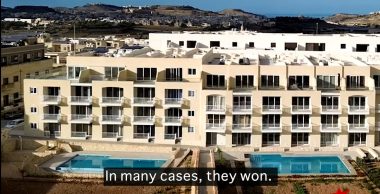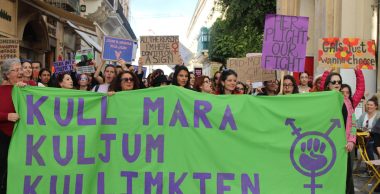The well-attended Iż-Żejjed Kollu Żejjed (Enough is Enough) protest was held in Valletta last year, on September 7, the eve of Victory Day. It was an important day for the organisation I represent, with weeks of planning, networking, organisation and late-night preparations culminating in a successful protest. Every minute was a minute well spent.
Activists and residents from all over Malta addressed the crowd from a small stage in front of Parliament. The choice of bringing people together in front of the House of Representatives, on the eve of a public holiday, was far from casual: Iż-Żejjed Kollu Żejjed provided a much-needed space for many citizens who have grown disillusioned with politicians’ will to do something about the unfettered dominion of the construction lobby over the country, and our everyday lives.
It’s important to allay a few myths before the convenient ‘anti-economy’ rhetoric starts being bandied about whenever NGOs propose the regulation of this sector.
Together with thousands of citizens, we understand that governments prioritise the economy. But economic growth, just like any economic model, should respect citizens and the environment without a disproportionate reliance upon a single sector (such as construction).
In Malta, this dependence has come at a very high cost to the quality of life of residents, taxpayers and citizens across the islands.
This high cost is quantifiable in pressure on the environment and open spaces, pressure on resources such as space and sunlight, air quality, pressure on the road network and pressure on our biodiversity.
But higher costs are being borne by citizens, considering the tragedy that cost Miriam Pace’s life in March 2020, that left people homeless in summer 2019, and that left many construction workers dead and injured throughout the years. Even worse, these victims have to bear the psychological and financial burden of the ill-deeds of the construction lobby.
We believe, however, that a protest about construction alone would not be enough to grab this reddest of bulls by the horns; far from being an end in itself, or a show of force, Iż-Żejjed Kollu Żejjed served as a platform for bigger things.
After a year of consultation with technical experts, residents and other NGOs, we are pleased to present ‘Reforming Planning and Construction in Malta’, a document that tackles the much-needed construction reform in a wide-ranging manner while looking at other areas of interest beyond construction. Our proposals touch upon six different sectors, starting from a number of proposals that seek to do away with the many loopholes developers can use to circumvent existing Planning Authority policies, as well as proposals aimed at strengthening individual policies.
In the second chapter, the proposals focus on the authorities responsible for planning and the environment, whereby we are proposing changes to the way Planning Authority boards are composed and operate, and the introduction of parliamentary scrutiny for the appointment of personnel to the various boards.
Large-scale projects are also under the lens in this document, with a proposal to give more power to local councils and residents across Malta and also the enactment of national and local masterplans which has been overdue since time immemorial.
When it comes to the regulation of the building industry itself, the salient proposals include the creation of a public complaints system and a blacklisting mechanism for contractors and developers who fall foul of the rules; the introduction of a legal framework for all building and construction regulations under one Act; and a raft of proposals aimed at protecting residents from neighbouring construction works, as well as the oft-forgotten workers of the construction industry.
Roads and transportation are tackled in the fifth chapter. In this section, proposals also focus on commuting, public transport, and the design of streets, while seeking to reduce the pressure of cars on our roads, and, in turn, reduce the pressure of roadbuilding on our agriculture.
Finally, the last chapter details proposals for a cleaner environment and respect for the natural environment. From waste management to solar rights via land reclamation, there are clear proposals to end the careless and shoddy practices that impact the environment, including, of course, the emphasis on creating public open spaces for us citizens to enjoy.
Creating this document has taken over a year. We might not be a body of professionals or experts, but we did, unlike other authors of other ill-fated reforms in this sector, reach out and consult. The result of these extensive consultations, including a public forum held in August 2019, is these 128 proposals aimed at introducing serious, efficient regulation across various sectors.
We intend to present our proposals to the relevant authorities, and look forward to an open and constructive debate about these reforms. We are still angry and shocked at the numerous deaths brought about by a lobby that merely professes the need for neighbourhoods safe from itself. We believe that lives shouldn’t be sacrificed on the altar of economic growth, and that an economy that truly works at the service of our country should respect every single resident and worker.
No more policies designed to be faulty. No more unworthy Planning Authority board members. No more house collapses, no more deaths on the workplace. Not another Miriam Pace.
Now, it’s time to regulate.
Wayne Flask is a member of Moviment Graffitti




